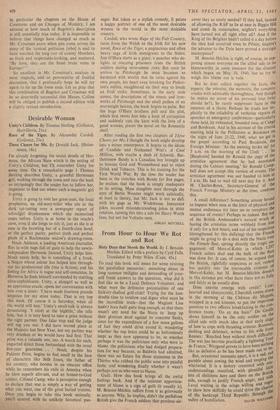Desirable Woman
I'm already forgetting the social details of Her- mosa, the African State which is the setting of Unity's Children, but I'll remember Unity for some time. On a remarkable page 1 Thomas Sterling describes Unity, a graceful Hermosan girl, walking through the town and into the bush so intriguingly that the reader has to follow her, impatient to find out where such a magnetic girl is going.
Unity is going to visit her great-aunt, the local prophetess, an old-story-teller who sits in the dark tut-tutting over a newspaper report of schoolgirl drunkenness which she memorised years before. Unity is at home in the oracle's cave, even if she longs to tidy it, just as she is at ease in the brawling bar of a fourth-class hotel, or the perfect purity, perfect truth and perfect plush of a Buchmanite widow's drawing-room.
Noah Addams, a leading American journalist, flies in with bags full of guilt to help the newly- independent Hermosa. Instead, Unity helps him. Noah needs help, he is something of a freak, a Negro whose colour has helped him through- out his professional life (this is fiction), and his feeling for Africa is vague and self-conscious. In Hermosa he finds himself surrounded by startling ultra-sophisticates. Unity, a shopgirl as well as an apprentice oracle, opens her conversation with him over a stout: 'I have made fourteen pounds sixpence for my store today. That is my top this week. Of course it is Saturday, when all the world will buy.' Unity's small-talk is always devastating. 'I excel at the highlife,' she tells him, but it is very hard to take a prize without the right partner. One false step and the judge will tap you out. I did have second place at the Majestic last New Year, but my partner was very drunken or we would have had first. That prize was a valuable one, too. A watch for each, imported direct from Switzerland with the usual five-year guarantee. . . .' Noah, despite his Pulitzer Prize, begins to feel small in the face of characters like Seth Jones, the father of his country, who boozes in an obscure office while he remembers his exile in America when he blew superb alto-sax, and an honest-to-God soldier, Colonel Camp, who is perceptive enough to declare that war is simply a way of getting what you want, one of the great buried truisms. Once you begin to take this book seriously, you'll quarrel with its unlikely historical pas-
sages. But taken as a stylish comedy, it paints a happy portrait of one of the most desirable women in the world in the most desirable country.
Cordell, who wrote Rape of the Fair Country, turns from the Welsh to the Irish for his new novel, Race of the Tiger, a pugnacious and often heavy saga of Irish immigrants to the States. Jess O'Hara starts as a gipsy, a puncher who de- lights in rescuing prisoners from the British soldiers during serio-comic riots. But once he arrives in Pittsburgh he soon becomes so hardened with wealth that he turns against his own people, his heart even breaking for Pinker- ton's militia, slaughtered on their way to break an Irish strike. Sometimes, in the early mob scenes, the descriptions of the streets and iron- works of Pittsburgh and the small pathos of an overweight heiress, the book begins to pulse. But the huge O'Hara brothers pall and the plot, which first twists Jess into a knot of corruption and suddenly cuts the knot with the love of a good woman, places the novel on the Romantic shelf.
After reading the first two chapters of Three Cheers for Me, I thought the book might develop into a minor masterpiece. It begins in the idiom of Candide and Nathanael West's A Cool Million, with maybe a dash of Schweik. Bar- tholomew Bandy is a Canadian boy brought up to honour God and Womanhood and to reject Drink and Tobacco. This is his training for the First World War. By the time the reader has been in the trenches with Bandy for five pages, he realises that the book is simply inadequate to its setting. Mass slaughter seen through the eyes of Bertie Wooster might work satirically, at least in theory, but Mr. Jack is not so deft with his gags as Mr. Wodehouse. Innocence jokes succeed misunderstanding jokes in strict rotation, turning this into a tale for Harry Worth fans, but not for Voltaire men.
ADRIAN MITCHELL


































 Previous page
Previous page